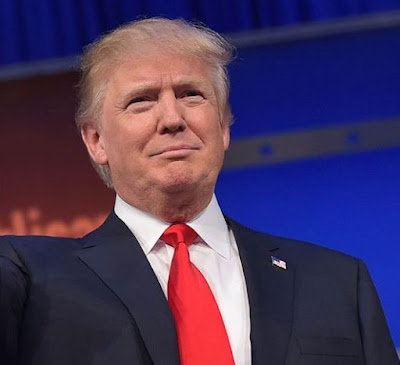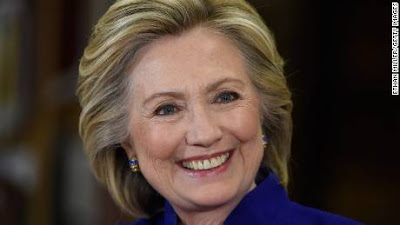
 Pictured are president-elect Donald Trump, boxing promoter Don King, and Hillary Clinton, who lost the presidency to Trump on Tuesday night
Pictured are president-elect Donald Trump, boxing promoter Don King, and Hillary Clinton, who lost the presidency to Trump on Tuesday night
(www.clevelandurbannews.com) / (www.kathywraycolemanonlinenewsblog.com). Ohio's most read Black digital newspaper and Black blog.Tel: (216) 659-0473 and Email: editor@clevelandurbannews.com
By Editor-in-Chief Kathy Wray Coleman, a-24-year journalist who trained at the Call and Post Newspaper in Cleveland, Ohio for 17 years, and who interviewed now President Barack Obama one-on-one when he was campaigning for president. As to the Obama interview, CLICK HERE TO READ THE ENTIRE ARTICLE AT CLEVELAND URBAN NEWS.COM, OHIO'S LEADER IN BLACK DIGITAL NEWS. (Note: A former biology teacher and longtime Cleveland activist, Coleman is the most read reporter in Ohio on Google Plus with some 3.2 million views)
Clinton did not give a concession speech Tuesday and instead spoke publicly for the first time since her devastating loss on Wednesday morning.
It was a close race.
Flanked by his wife Melania, the new First Lady of the United States, and other family members, Trump told supporters during his victory speech at election headquarters in Manhattan that he will work to bridge the partisan divide.
"I pledge to every citizen of our land that I will be president for all Americans, and this is so important to me," said Trump.
The president-elect promised to "work together and unify our great country."
It was a nasty and bitter campaign that will be remembered for its divisiveness, which was highlighted by Clinton's email controversy and Trump's disdain for Muslims, Mexicans, and the immigration community, not to mention his confrontations with women.
Some 12 women accused him of misconduct ranging from unwanted advances to outright groping them, which he dismissed as politically motivated and disingenuous.
And Trump was instrumental in beating Clinton, 69, in key battleground states, including North Carolina, Iowa, Florida and Ohio, a win with 52 percent of the vote that brought 18 electoral votes, and that set the stage for Clinton's ultimate defeat.
Unlike his predecessor nominees of Mitt Romney and Arizona Sen John McCain, both of whom lost to Obama, Trump campaigned heavily in the Buckeye state, and he courted the Black vote, to some degree.
He effectively won the support of a few Black suburban preachers in the delegate rich majority Black 11th congressional district, which includes Cleveland, and that of the Call and Post, a weekly Black newspaper with distributions in the Ohio cities of Cleveland, Columbus and Cincinnati that is owned and published by international boxing promoter Don King.
A Republican who backed Obama in 2008 and for reelection in 2012, King knew Trump through boxing ventures at Trump's Las Vegas hotels, and he readily endorsed him.
Led by Clinton ally Rep. Marcia L. Fudge, one of two Blacks in Congress from Ohio, Trump did lose in the 11th congressional district and in its Cuyahoga County, which is 29 percent Black.
But he drew on lower middle and working class Whites in the state, White men in general, and voters who had tired of Washington politics, and the status quo.
On the campaign trail, Trump promised to end Obamacare, a federal law, and said he would address terrorism, and would push a Supreme Court justice with a conservative thrust to replace Antonin Scalia.
Among a host of other initiatives, he pledged to strengthen immigration laws, expand educational choice, and revise NAFTA.
Clinton, a two time loser who lost the Democratic nomination to Obama in 2008 and to Trump on Tuesday, would not criticize Obamacare other than to say it needs critiquing, a posture which may have been her undoing.
And she embraced Obama's policies, and said she would continue his legacy.
Gerald Henley, a former Cleveland School Board member and Trump supporter, told Cleveland Urban News.Com that voters are smarter than they get credit for, and can glean through a biased and slanted mainstream media that mistreated Trump and "has crippled this country's communication process."
Henley said that Trump "was not your average nickle and dime politician and he appealed to people, Black White, Hispanic and other, that want systemic change in Washington."
Likely the most startling political upset in U.S. history, Trump said weeks before his unprecedented win that mainstream media outlets were corrupt in predicting his demise and that had he lost it would have been the result of a "rigged election."
Blacks and the Muslim and Hispanic communities as a whole are not Trump's friends, even if some were Luke-warm to Clinton, some Blacks still reeling from former president Bill Clinton's crime bill that has disproportionately impacted Black America.
Hispanics were not as hostile as expected, Trump matching Mitt Romney in overall voter support from an ethic group that he repeatedly insulted.
Blacks that rallied to President Obama, a two-term president and the nations' first Black president, simply did not rally to Clinton, some even voting for Trump.
Black voters in general came through for the former first lady and former U.S. senator representing New York.
But enthusiasm was moderate at best, data show, Clinton under-performing among Blacks at roughly six points less that Obama.
Clinton, some said, took the Black community for granted, and should have campaigned more heavily in urban communities.
She did, however, win minority women and college educated White women as predicted.
In comparison, working class White women chose Trump in large numbers, as did a large percentage of poor White women, political pundits said.
Early voting was a factor with roughly 47 million people voting early nationwide and some 8.5 million in Ohio alone.
| < Prev | Next > |
|---|








